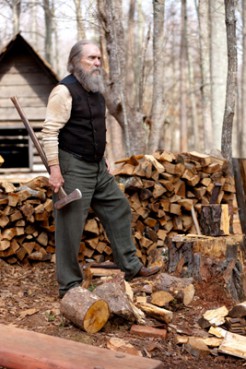
(RNS4-JUL21) Actor Robert Duvall plays Tennessee hermit Felix Bush in the upcoming film, “Get Low.” For use with RNS-DUVALL-PROFILE, transmitted July 21, 2010. RNS photo courtesy Sony Pictures Classics.

(RNS4-JUL21) Actor Robert Duvall plays Tennessee hermit Felix Bush in the upcoming film, “Get Low.” For use with RNS-DUVALL-PROFILE, transmitted July 21, 2010. RNS photo courtesy Sony Pictures Classics.
THE PLAINS, Va. (RNS) Amid the rolling hills of Northern Virginia, actor Robert Duvall lives in a rural hamlet not unlike the on-screen settings where he has immersed himself in Southern culture.
It is, his wife says, “the last station before heaven,” even if Duvall’s cast of fallen characters might never make it all the way.
His characters are often touched by faith, from washed-up country singer Mac Sledge in “Tender Mercies” to a hermit in the upcoming “Get Low,” which opens July 30 in New York and Los Angeles and nationwide in August.
And then there was Euliss “Sonny” Dewey, a Texas preacher on the run from the law and his own foibles in the “The Apostle,” which Duvall wrote and directed.
“You don’t have to agree with everything that these people believe in, but you want to try to portray them as accurately as possible … without dictating or putting judgments on it,” Duvall said in an interview on the farm where he’s lived for 15 years.
Down an unpaved road and surrounded by a silo, a barn and vast farmland, Duvall is almost as secluded as Felix Bush, the mysterious man he plays in “Get Low.” Bush, a Tennessee recluse, seeks the help of ministers to speak at a “funeral party” where he plans to reveal a deeply held secret before he dies.
“I guess maybe he needed that reinforcement of someone who was kind of an ally or believed him, kind of like soul brothers in a way,” said Duvall, dressed in a cream-colored shirt with the monogram “RL,” the first letters of his and his wife’s Luciana’s first names.
The 79-year-old actor said characters like Bush, as well as Sledge and Dewey, deserve time on the movie screen — with all their flaws and complexities — to reflect the rich spiritual and cultural stew of Southern culture.
“They should be shown, should be seen, should be portrayed but … with contradictions,” he said, noting that even peace-loving Jesus chased moneychangers out of the temple “with a whip.”
It’s the kind of portrayal that isn’t often seen in Hollywood, said Craig Detweiler, director of the Center for Entertainment, Media and Culture at Pepperdine University in Malibu, Calif.
“By dignifying seemingly common people, he’s also elevating and humanizing Christian faith in profound ways,” said Detweiler. “Hollywood producers may ignore the flyover district between Los Angeles and New York, but Duvall is very rooted or drawn to that kind of land and place.”
Already known for his roles in films like “The Godfather’ and “To Kill a Mockingbird,” Duvall became a researcher as he developed plans for “The Apostle,” the 1997 film that earned him a best-actor nomination. He had already taken home an Oscar for his portrayal of Sledge, in 1984.
He fondly recalls spending more than a dozen years traversing the country, visiting churches, picking up the signature cadences of black preachers, and recruiting non-actors for the film. The spark of the project, he said, was a visit to a church in Hughes, Ark., the real-life home of a fictional character he was portraying in an off-Broadway play.
“I said, `Wow, I’ve never seen this,”‘ he said of the little white clapboard Pentecostal church with a woman in the pulpit and a man on the guitar. “Someday, I want to put this on film.”
When he couldn’t get funders for the movie, Duvall ponied up $5 million of his own. In his tour of churches, he was moved — a “wonderful feeling,” he said — by the choir of New York’s Abyssinian Baptist Church, and recruited extras for Dewey’s One Way Road to Heaven Holiness Temple at a meeting of the Church of God in Christ.
“You don’t have to totally believe in what you see, but you can’t patronize it,” he said. “I put real people — the real preachers, real people from the congregations, in my movie to give it a sense of truth. That was a truth gauge.”
William Blizek, founding editor of the Journal of Religion and Film, said Duvall’s use of real religious people and actual words from preachers showed the actor’s interest in accuracy without turning them into “saintly characters that could do no wrong.”
“In `The Apostle’ it was of special concern to him to try to get this right,” said Blizek. “He thought other movies had sort of mocked this kind of fundamentalist evangelical, what he calls the Holiness Church,” he said.
Like Bush in “Get Low,” the characters he played in “The Apostle” and “Tender Mercies” sought redemption or forgiveness. But Duvall said the greatest crime of the runaway preacher in “The Apostle” was one of passion, not premeditation.
“He killed a man out of the moment, he didn’t premeditate it, like King David did in the Psalms,” Duvall said. “Am I right? Every time I read the Psalms — which are beautiful — I think of that. … Yeah, what Sonny did wasn’t as bad as that.”
Duvall, who spent so much time delving into the faiths of the men he played on screen, is more reticent about his own. “My own faith is a very personal thing,” he said, “so I just don’t talk about it.”




